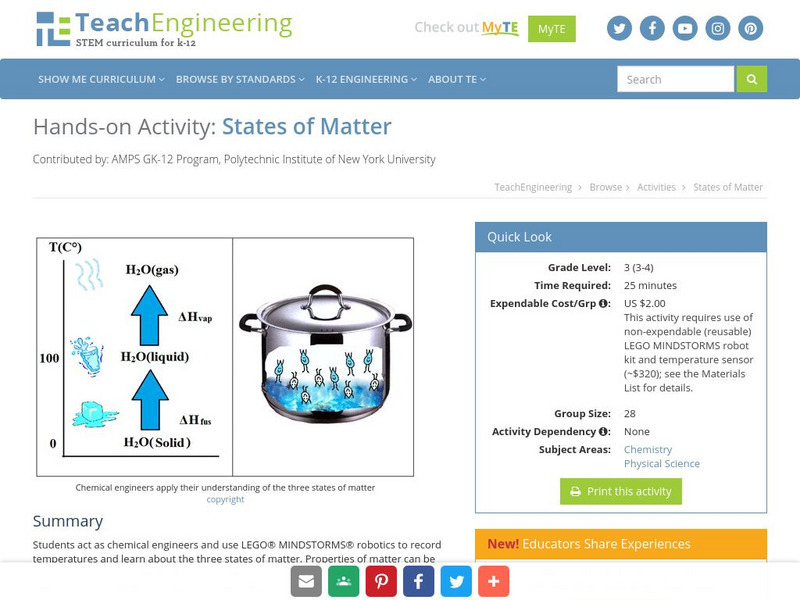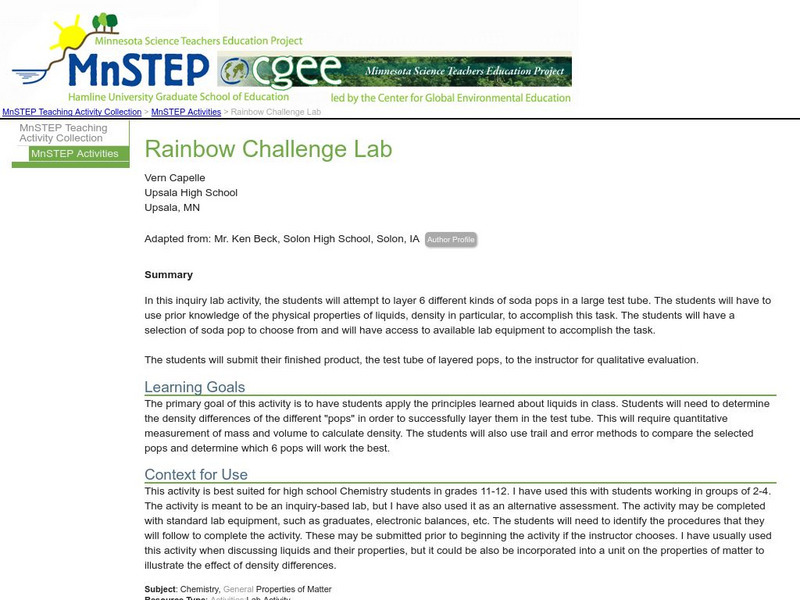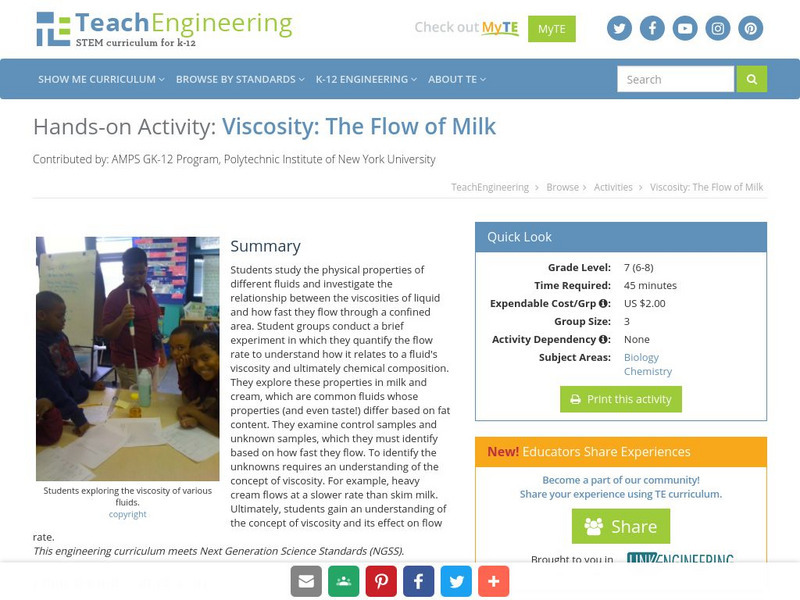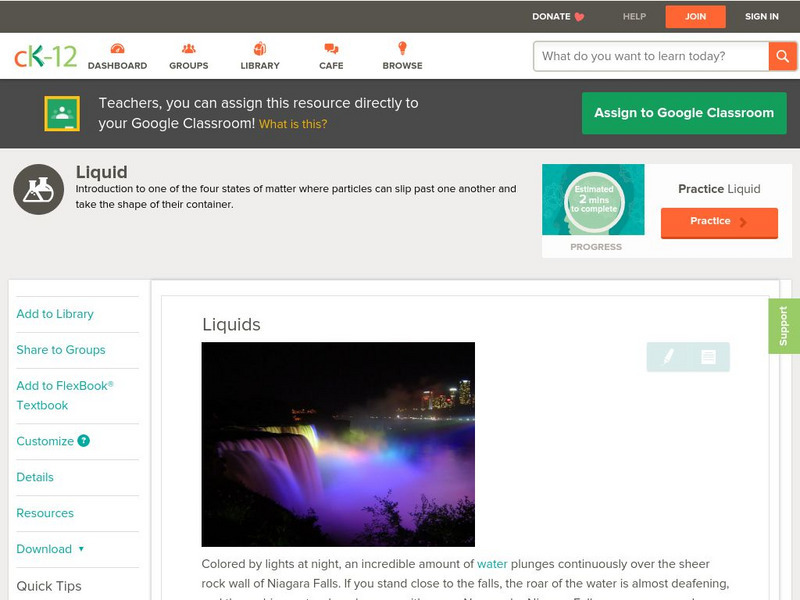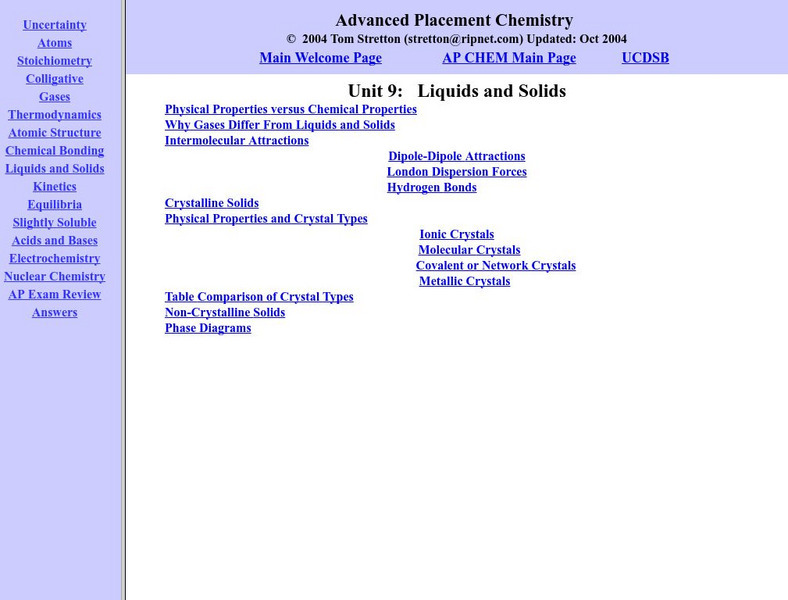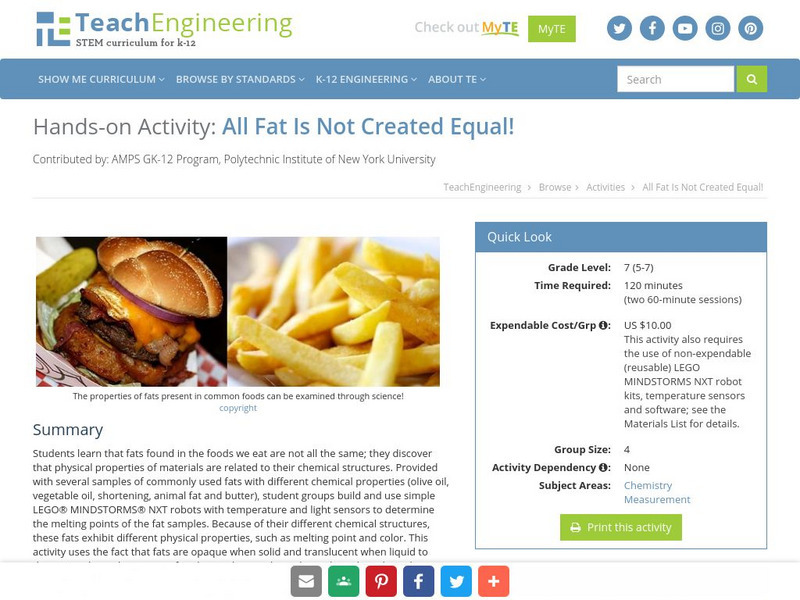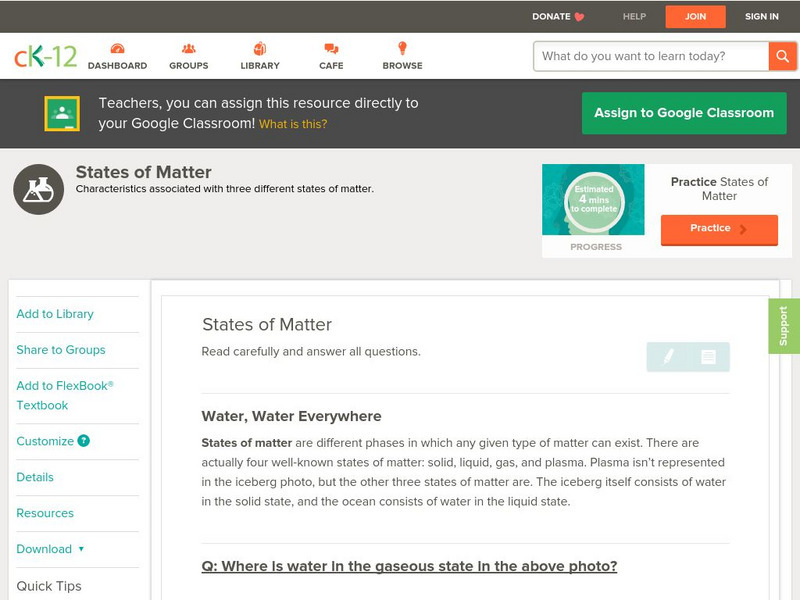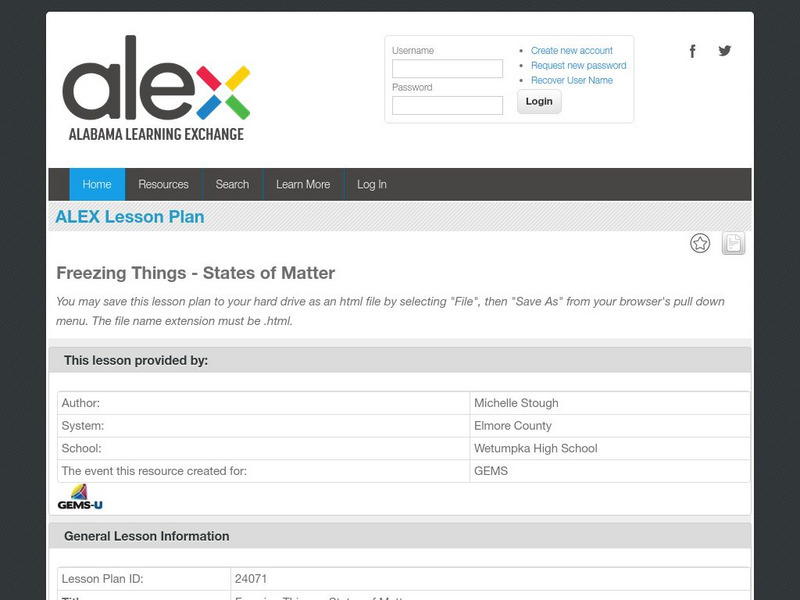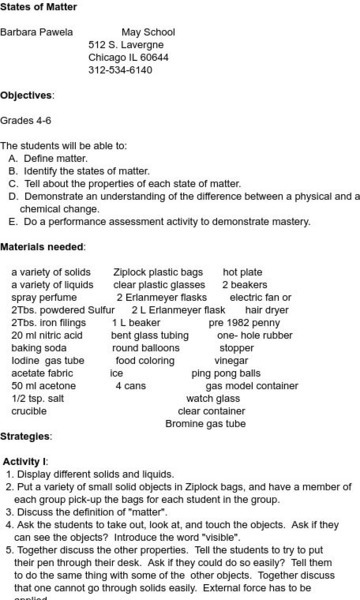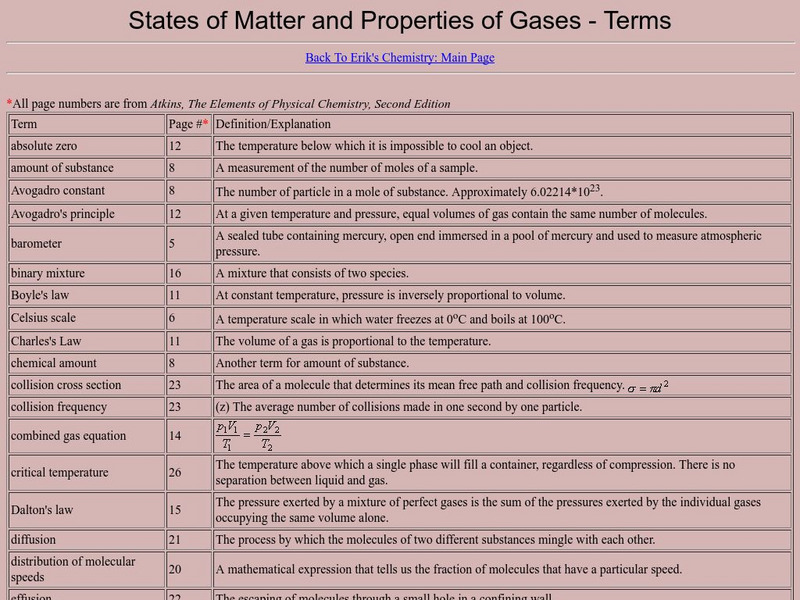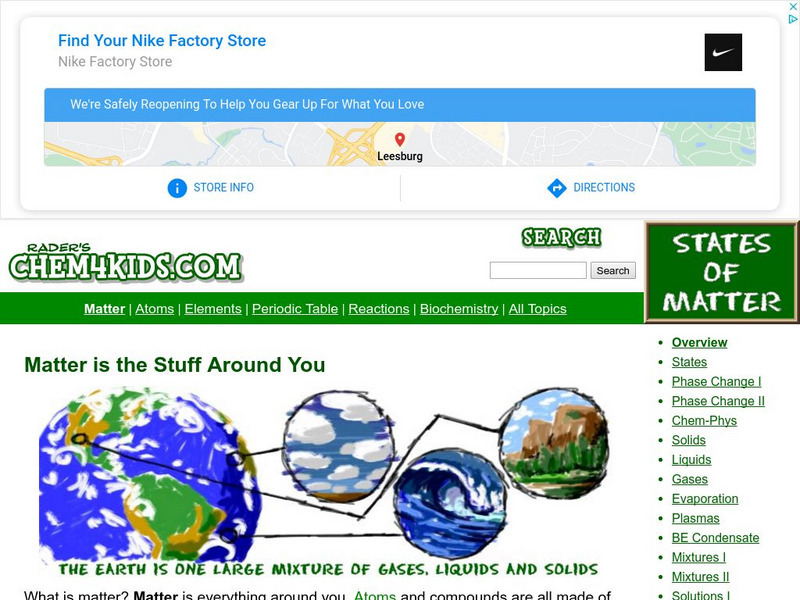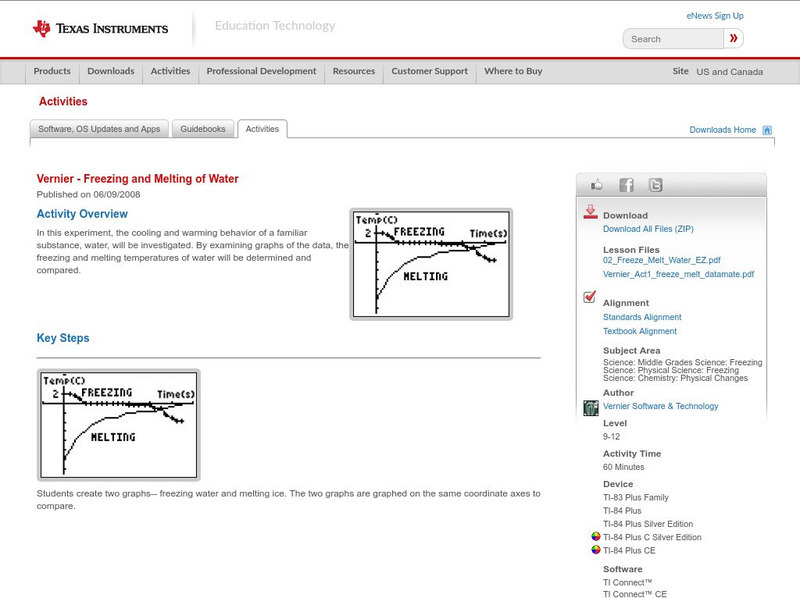TeachEngineering
Teach Engineering: States of Matter
Students act as chemical engineers and use LEGO MINDSTORMS NXT robotics to record temperatures and learn about the three states of matter. Properties of matter can be measured in various ways, including volume, mass, density and...
Science Education Resource Center at Carleton College
Serc: Rainbow Challenge Lab
In this inquiry lab activity, learners will attempt to layer 6 different kinds of soda pops in a large test tube using their knowledge of density and other physical properties of liquids.
US Geological Survey
Water Properties
This site provides a discussion of the physical properties of water. Click Home to access the site in Spanish.
TeachEngineering
Teach Engineering: Viscosity: The Flow of Milk
Students study the physical properties of different fluids and investigate the relationship between the viscosities of liquid and how fast they flow through a confined area. Student groups conduct a brief experiment in which they...
CK-12 Foundation
Ck 12: Physical Science: Liquids
[Free Registration/Login may be required to access all resource tools.] Properties of liquid matter.
Upper Canada District School Board
Tom Stretton's Advanced Placement Chemistry: Liquids and Solids
Take on this self-guided advanced level e-text, and learn about the chemical and physical structure of liquids and solids.
University Corporation for Atmospheric Research
Ucar: Just a Phase: Water as a Solid, Liquid, and Gas
This site helps students construct a model of the arrangement of water molecules when present as solid, liquid or gas. Includes background information, lesson plans, links to standards and assessment ideas.
Science Education Resource Center at Carleton College
Serc: Investigating Polymers: Comparing Two Liquid Glue Based Polymers
In this experiment, students will work in small groups to create two different polymers, similar to Flubber and Silly Putty, using Elmer's glue, liquid laundry starch, and Borax. They will then compare the properties of the two polymers....
TeachEngineering
Teach Engineering: All Fat Is Not Created Equally!
Students learn that fats found in the foods we eat are not all the same; they discover that physical properties of materials are related to their chemical structures. Provided with several samples of commonly used fats with different...
TeachEngineering
Teach Engineering: How Cold Can You Go?
Students explore materials engineering by modifying the material properties of water. Specifically, they use salt to lower the freezing point of water and test it by making ice cream. Using either a simple thermometer or a mechatronic...
CK-12 Foundation
Ck 12: Chemistry: States of Matter
[Free Registration/Login may be required to access all resource tools.] Definition of state of matter and the three common states of matter and their differences.
New York University
New York University: States of Water
Use this resource to learn about the three different phases of water; solid, liquid, and gas. What happens to water as it changes into a solid or gas? Includes short and easy to do activity.
Alabama Learning Exchange
Alex: Freezing Things: States of Matter
The class will go back over the Power Point presentation on chemical and physical properties. The teacher will then conduct numerous liquid nitrogen demos. This instructional activity is used early in the Chemistry course. The students...
TeachEngineering
Teach Engineering: Measuring Viscosity
Students calculate the viscosity of various household fluids by measuring the amount of time it takes marble or steel balls to fall given distances through the liquids. They experience what viscosity means, and also practice using...
Science and Mathematics Initiative for Learning Enhancement (SMILE)
Smile: States of Matter
A comprehensive lesson plan site that contains a number of activities to aid in teaching about the states and properties of matter and the difference between a physical and chemical change.
Chem Tutor
Chem Tutor: States of Matter
A very descriptive site that allows students to understand the different states of matter at the atomic level. Also discusses the process of phase changes and displays phase change graphs. Thermochemistry is also touched upon for high...
American Chemical Society
Middle School Chemistry: Lesson Plans: Using Chemical Change to Identify Unknown
Learners observe reactions of liquids with different known powders in this lesson. Unknown powders are then identified using characteristic chemical changes.Site includes a procedure, teacher instructions, and video instruction.
Other
States of Matter and Properties of Gases: Terms
A very complete list of terms that are important to the study of gases. This resource is a web archive.
Chem4kids
Chem4 Kids: Matter
"Matter is everything." So begins this comprehensive website on the physical and chemical properties of matter in its four main states: solids, liquids, gases, and plasmas. The text is large and easy-to-read. Students will enjoy the...
Texas Instruments
Texas Instruments: Freezing and Melting of Water
Freezing temperature, the temperature at which a substance turns from liquid to solid, and melting temperature, the temperature at which a substance turns from a solid to a liquid, are characteristic physical properties. In this...
Wikimedia
Wikipedia: Materia
Explore the concept of matter in this Spanish-language encyclopedia entry. This site features the properties of matter, the Law of Conservation of Matter, and other important features of matter.
TeachEngineering
Teach Engineering: Viscous Fluids
Students are introduced to the similarities and differences in the behaviors of elastic solids and viscous fluids. Several types of fluid behaviors are described--Bingham plastic, Newtonian, shear thinning and shear thickening--along...
eSchool Today
E School Today: What Is Matter
Learn about matter, its three states, changes of state, how matter behaves, and physical and chemical changes in matter.
Science and Mathematics Initiative for Learning Enhancement (SMILE)
Smile: Physical and Chemical Changes
This lesson plan focuses on the difference between physical and chemical changes of matter.
